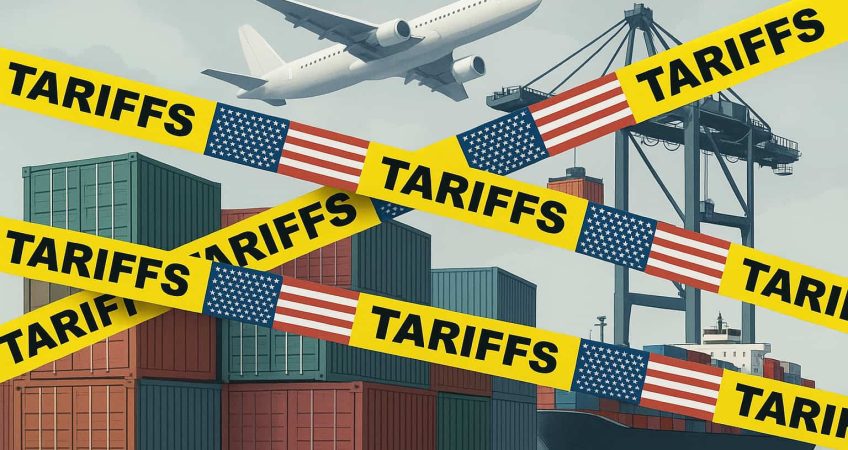
International trade tariffs are one of the biggest factors that affect logistics operations in a constantly changing global commerce. It directly affects shipping costs, trade routes, and the overall efficiency of supply chains. The latest US tariff hike is likely to slow down freight movement, as it might create several challenges for importers, exporters, and logistics service providers worldwide.
Freight service providers need to adapt to higher costs, new trade routes, and updated international trade guidelines to offer reliable services to their clients. Continue reading this article to understand the effects of recent US tariff changes on global logistics, shipping, and supply chains.
Overview of US Tariff Changes (11 to 15 August 2025)
The U.S. tariff update last week, with new duties and extensions, became a key topic for the global trade sector. The first change was the extension of the US-China traffic suspension for another 90 days. This pause means both countries now have more time for negotiations and to discuss issues like technology, farming goods, and others, as the deadline is pushed to November 10, 2025. This delay will help in delaying new tariff increases. Similarly, the US and EU have also agreed to delay extra tariffs on steel, aluminum, and cars.
Meanwhile, the tariff tensions with India are growing, as the US announced an addition of 25% duty on Indian goods. This raises the total tariff on Indian imports to 50%, and this guideline will take effect on 27 August. Textiles, jewelry, and auto parts are the three key sectors expected to be heavily affected by this US tariff hike.
At the same time, reciprocal tariffs have now come into force. This new structure has replaced the earlier 10-41% rates with a 20-50% range for countries without finalized agreements. However, key sectors like semiconductors, pharmaceuticals, and essential minerals are fully exempt from them. The USMCA provisions have ensured that more than 80% of trade with Canada and Mexico stays tariff-free.
US Tariff Hike Introduces Freight Forwarding Challenges
The recent updates in tariff policies by the US have introduced several challenges for businesses operating in the global freight forwarding sector, which are:
- Higher Shipping Costs
The first impact of the US tariff hike on the global logistics sector is that it will increase the price of imported goods. This is because freight forwarders incur more operating costs due to increased customs duties. These extra costs will be passed on to customers, which might reduce the demand for imported goods.
- Supply Chain Adjustments
Businesses engaged in the global trade sector might shift their sourcing to avoid higher costs from increased international trade tariffs. Moving production to countries not affected by the new tariffs and increasing local manufacturing are two expected changes in the global supply chain scenario. Freight forwarders need to shift their shipping routes and logistics plans.
- Market Uncertainty
The US tariff hike can cause sudden changes in trade volumes and market demands. This means businesses have to deal with unpredictable shipment patterns and keep themselves updated to deal with market uncertainty issues.
- Stricter Trade Rules
The constantly updating tariff policies have increased the paperwork load and compliance checks. This will lead to longer processing times and make operations for traders and freight forwarders more challenging.
Strategies for Shippers to Deal with Tariff Hike
Shippers can navigate the challenges introduced by the recent US tariff hikes by implementing these strategies:
- Stay updated about changes in international trade guidelines to maintain legal and compliant operations.
- Working together with freight services providers with a strong international network and in-depth knowledge of global trade compliance regulations.
- Investing in advanced logistics solutions for the best shipping route planning, simplified customs clearance, and others that can help businesses reduce operational costs.
Navigating Tariff Shifts with the Right Support
The 2025 US tariff introduced a great shift in international trade policy and has affected businesses operating in the freight forwarding sector. However, the challenges introduced by the policy changes can be tackled with proper planning. Having a reliable partner can significantly help businesses to deal with rising customs duties and develop innovative global supply chain strategies.
Brightway Logistics, a leading freight forwarding and logistics company in the UAE, understands how shifting tariffs and trade rules are affecting global supply chains. Our team can help businesses deal with these challenges, as we offer smart freight solutions, complete compliance support, and flexible routing options. With us, you can easily move your goods smoothly across borders, as we help you deal with the latest shipping industry challenges.
Also Read: UAE Implements 12-Digit HS Codes
